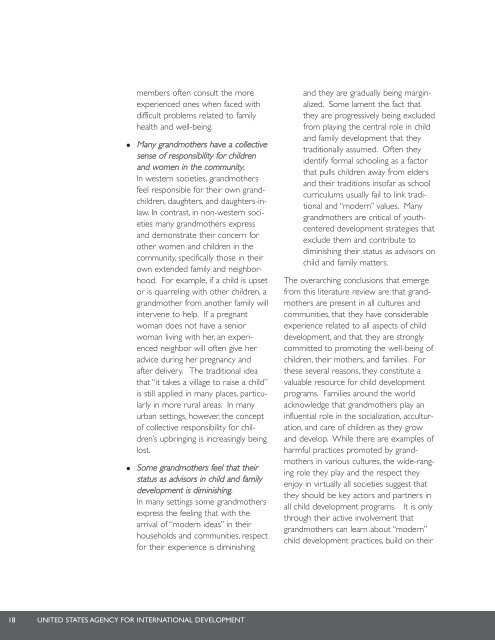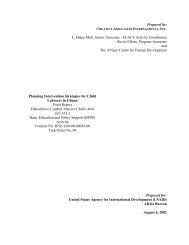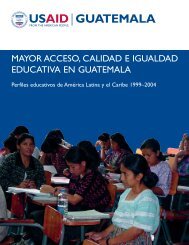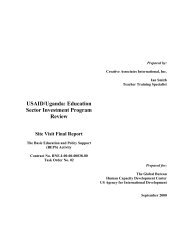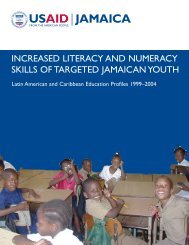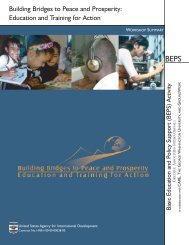Grandmothers: A Learning Institution - Basic Education and Policy ...
Grandmothers: A Learning Institution - Basic Education and Policy ...
Grandmothers: A Learning Institution - Basic Education and Policy ...
- No tags were found...
You also want an ePaper? Increase the reach of your titles
YUMPU automatically turns print PDFs into web optimized ePapers that Google loves.
members often consult the moreexperienced ones when faced withdifficult problems related to familyhealth <strong>and</strong> well-being.• Many gr<strong>and</strong>mothers have a collectivesense of responsibility for children<strong>and</strong> women in the community.In western societies, gr<strong>and</strong>mothersfeel responsible for their own gr<strong>and</strong>children,daughters, <strong>and</strong> daughters-inlaw.In contrast, in non-western societiesmany gr<strong>and</strong>mothers express<strong>and</strong> demonstrate their concern forother women <strong>and</strong> children in thecommunity, specifically those in theirown extended family <strong>and</strong> neighborhood.For example, if a child is upsetor is quarreling with other children, agr<strong>and</strong>mother from another family willintervene to help. If a pregnantwoman does not have a seniorwoman living with her, an experiencedneighbor will often give heradvice during her pregnancy <strong>and</strong>after delivery. The traditional ideathat “it takes a village to raise a child”is still applied in many places, particularlyin more rural areas. In manyurban settings, however, the conceptof collective responsibility for children’supbringing is increasingly beinglost.• Some gr<strong>and</strong>mothers feel that theirstatus as advisors in child <strong>and</strong> familydevelopment is diminishing.In many settings some gr<strong>and</strong>mothersexpress the feeling that with thearrival of “modern ideas” in theirhouseholds <strong>and</strong> communities, respectfor their experience is diminishing<strong>and</strong> they are gradually being marginalized.Some lament the fact thatthey are progressively being excludedfrom playing the central role in child<strong>and</strong> family development that theytraditionally assumed. Often theyidentify formal schooling as a factorthat pulls children away from elders<strong>and</strong> their traditions insofar as schoolcurriculums usually fail to link traditional<strong>and</strong> “modern” values. Manygr<strong>and</strong>mothers are critical of youthcentereddevelopment strategies thatexclude them <strong>and</strong> contribute todiminishing their status as advisors onchild <strong>and</strong> family matters.The overarching conclusions that emergefrom this literature review are that gr<strong>and</strong>mothersare present in all cultures <strong>and</strong>communities, that they have considerableexperience related to all aspects of childdevelopment, <strong>and</strong> that they are stronglycommitted to promoting the well-being ofchildren, their mothers, <strong>and</strong> families. Forthese several reasons, they constitute avaluable resource for child developmentprograms. Families around the worldacknowledge that gr<strong>and</strong>mothers play aninfluential role in the socialization, acculturation,<strong>and</strong> care of children as they grow<strong>and</strong> develop. While there are examples ofharmful practices promoted by gr<strong>and</strong>mothersin various cultures, the wide-rangingrole they play <strong>and</strong> the respect theyenjoy in virtually all societies suggest thatthey should be key actors <strong>and</strong> partners inall child development programs. It is onlythrough their active involvement thatgr<strong>and</strong>mothers can learn about “modern”child development practices, build on their18 UNITED STATES AGENCY FOR INTERNATIONAL DEVELOPMENT


